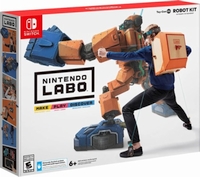 Nintendo has announced a new partnership with the Institute of Play to make their cardboard-powered Nintendo Labo kits available in schools across the United States:
Nintendo has announced a new partnership with the Institute of Play to make their cardboard-powered Nintendo Labo kits available in schools across the United States:
Nintendo and the Institute of Play have teamed up to bring Nintendo Labo kits into elementary classrooms nationwide, combining the innovative play of Nintendo Labo with the basic principles of science, technology, engineering, art and mathematics (STEAM) to inspire kids and help make learning fun. Nintendo will provide Nintendo Labo: Variety Kits and Nintendo Switch systems to participating classrooms to reinforce skills such as communication, creativity and critical thinking. The program aims to reach approximately 2,000 students ages 8 to 11 during the 2018-2019 school year.
Nintendo Labo kits provide the tools to make DIY creations called Toy-Con, including a Fishing Rod, Piano and RC Car, among others; play games with these Toy-Con creations through a mix of physical and digital experiences; and discover how Nintendo Switch technology brings it all to life. Ever since the first two Nintendo Labo kits debuted in April, people of all ages have become amateur inventors using a mode included in the software called Toy-Con Garage. Toy-Con Garage introduces basic principles of programming, allowing anyone to use the tools and technology within each kit to develop their own imaginative creations, from fully-realized musical instruments to analog clocks and much more.
Nintendo and the Institute of Play are currently developing a Nintendo Labo Teacher Guide that will “allow other educators to implement Nintendo Labo in the classroom to promote the development of skills such as creative problem solving and collaboration.” Teachers or librarians from schools that wish to participate in the program can sign up at the Institute of Play’s website.
